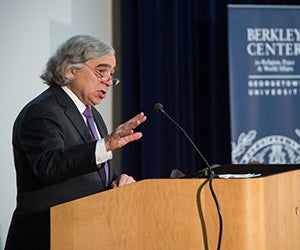Title: Georgetown and State Department Co-host Religion and Climate Symposium
Faith leaders, scholars and policymakers met at Georgetown and the State Department this week to address the complex intersection of faith, science and policy surrounding global climate change.

November 11 – Two months after Pope Francis’s historic United States visit and a month before international climate talks in Paris, faith leaders, scholars and policymakers met at Georgetown Monday and Tuesday to address the complex intersection of faith, science and policy surrounding global climate change.
Georgetown’s Berkley Center for Religion, Peace, and World Affairs and the U.S. Department of State’s Office of Religion and Global Affairs co-sponsored the two-day symposium.
“Georgetown has a significant capacity to convene thought leaders and help to shape policy conversations about pressing global problems,” said Berkley Center Managing Director Michael Kessler. “Climate change will disrupt our world on a massive scale, and effect everyone, especially the poorest among us. We have a responsibility to help find a solution.”
The event marked the second month in row that the State Department has partnered with Georgetown to address climate change and energy policy. Last month Secretary of State John Kerry held his Climate and Clean Energy Forum at Georgetown and the State Department.
Role of Religious Communities
Two panels during the first day of the November 9-10symposium at Georgetown addressed the moral and theological underpinnings of the climate action movement, and the connections between climate, justice and poverty.
“Religious communities are at the forefront of the global effort to mitigate global climate change and engage in efforts to adapt to its consequences,” said Shaun Casey, U.S. special representative for religion and global affairs in a blog before the event.
Francis Slakey, the university’s Upjohn Lecturer on Physics and Public Policy and executive director of the Georgetown University Energy Prize called the symposium a “stirring two days filled with hope, purpose and dedication.”
“With a deep spiritual commitment to preserving our common home, the faith community brings a powerful voice to action on climate change,” he said.
Theology, Ethics and Environment
Drew Christiansen, S.J., a Berkley Center senior research fellow and School of Foreign Service moderated the first panel on Theology, Ethics, and the Environment.
Participants explored the ways that religious actors are responding to climate change, drawing upon the resources of various moral and religious traditions.
“At this point of historic transformation, we have perspectives from science, policy, economics, technology and law, but also this new moral, spiritual and religious energy coming from the world’s religions as well as from secular humanism, environmental ethics and philosophy,” said Mary Evelyn Tucker, co-founder of the Forum on Religion and Ecology at Yale University.
She said that Pope Francis’s encyclical on the environment is a major part of the transformation and will build on the several decades of work on religion and ecology.
The panel also included Akbar Ahmed, professor at American University, Julia Watts Belser, assistant professor in Theology at Georgetown and Willis Jenkins, associate professor at the University of Virginia.
Climate Change and Poverty
Katherine Marshall, senior fellow at the Berkley Center and executive director of the World Faiths Development Dialogue, moderated a second panel addressing the unique challenges climate change poses for the poor around the globe.
Panelists included Ruth Messinger of the American Jewish World Service, Catholic University’s Maryann Cusimano Love, the World Bank’s Adam Taylor, and the National Association of Evangelicals’ Galen Carey, who discussed ways in which religious communities and global development leaders and NGOs can address these challenges.
Taylornoted that the World Bank has made 188 climate change-related investments in 59 countries in the last year alone.
Symposium participants and Georgetown centers and organizations also shared posters and other materials showcasing climate advocacy at the local, national and international levels.
“For Georgetown to host such a poignant event with the State Department just before the COP21 summit truly underscores the university’s commitment to Jesuit values – opening discussions in wider contexts to connect students with the global community,” said Eleanor Field, a student in the Masters of Science in Global Health program. “As a masters student studying global health, this symposium has encouraged me to always consider a moral foundation for policy interventions.”
The Innovation Agenda

Energy Secretary Ernest Moniz was the keynote speaker of the second day of the conference, held at the State Department and the White House.
“We are taking to Paris a very strong focus on the clean energy technology innovation agenda,” Moniz said. That an agenda will help drive down the cost of clean energy technology, which in turn can help “bring along the poor and the underserved, in the global community,” he explained.
“This group has unique access to a broad and concerned population with both environmental and moral imperatives,” Moniz said of the symposium participants. “I will not lose sight of the need, that as we address these large-scale economic, environmental and security goals, we cannot forget the underserved.”
Georgetown and Climate
In addition to this month’s symposium on climate change and religion and Kerry’s forum last month, Honduran Cardinal Oscar Rodriquez spoke at Georgetown about Pope Francis’ environmental encyclical Laudato Si at an event convened by the university’s Initiative on Catholic Social Thought and Public Life.
Rodriguez said the document makes a powerful moral case for the dual obligation to care for creation and care for the poor.
About two-dozen students explored how to make the Georgetown campus more sustainable during an all-day workshop sponsored by the university’s student association, the Beeck Center for Social Impact and Innovation, and the Office of Sustainability this past September.
“The goal is to be as ambitious as possible,” said Chris Augostini, senior vice president and chief operating officer, at the latter event. “The goal we ought have for next Earth Day 2016, selectively as a body [is to put] forward a very ambitious agenda for this entire community.”